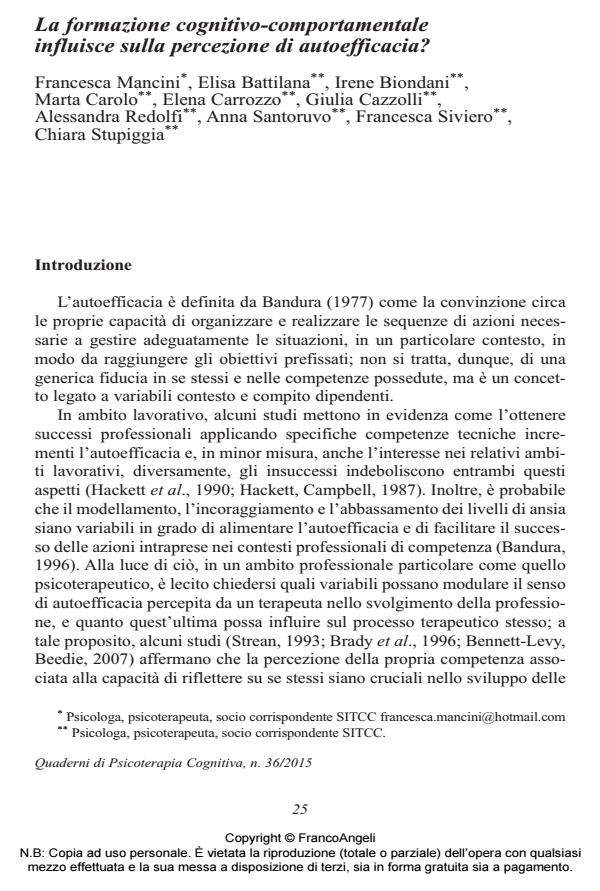The cognitive-behavioral training affects on perceived self-efficacy?
Journal title QUADERNI DI PSICOTERAPIA COGNITIVA
Author/s Francesca Mancini, Elisa Battilana, Irene Biondani, Marta Carolo, Elena Carrozzo, Giulia Cazzolli, Alessandra Redolfi, Anna Santoruvo, Francesca Siviero, Chiara Stupiggia
Publishing Year 2015 Issue 2015/36
Language Italian Pages 15 P. 25-39 File size 149 KB
DOI 10.3280/QPC2015-036003
DOI is like a bar code for intellectual property: to have more infomation
click here
Below, you can see the article first page
If you want to buy this article in PDF format, you can do it, following the instructions to buy download credits

FrancoAngeli is member of Publishers International Linking Association, Inc (PILA), a not-for-profit association which run the CrossRef service enabling links to and from online scholarly content.
In the literature it has been studied the sense of self-efficacy among the cognitivebehavioral trainees. Data show how self-efficacy is increased by the positive attitude and the ability of problem-solving, while decreases in students with high levels of neuroticism or students using avoidance strategies. Controversial results have been gathered regarding the effect of drop-out on psychotherapy trainees and about self-efficacy changes in the course of the training. The aim of this study is to investigate self-efficacy in cognitivebehavioral trainees, verifying which variables can affect it significantly. Two studies will be presented. Study 1 aims to verify the possible connection between the number of patients, their diagnostic category and self-efficacy. Study 2 is trying to evaluate the connection between self-efficacy, coping, personality, number and type of patients in a group of students during their training. The results of Study 1 show how self-efficacy is positively related to the number of patients treated and the diagnosis in Axis I (DSM-IV-TR). In addition, the results of the Study 2 on 98 students in the first year of training have confirmed that self-efficacy is increased by the positive attitude and the ability of problem-solving, while it is not influenced by the number of drop-out. In contrast, the number and the type of psychopathology of patients do not appear to be related to the sense of self-efficacy, perhaps because of the small number of patients treated during the first year of training.
Keywords: Self-efficacy, coping, personality, patients, diagnosis, training
Francesca Mancini, Elisa Battilana, Irene Biondani, Marta Carolo, Elena Carrozzo, Giulia Cazzolli, Alessandra Redolfi, Anna Santoruvo, Francesca Siviero, Chiara Stupiggia, La formazione cognitivo-comportamentale influisce sulla percezione di autoefficacia? in "QUADERNI DI PSICOTERAPIA COGNITIVA" 36/2015, pp 25-39, DOI: 10.3280/QPC2015-036003